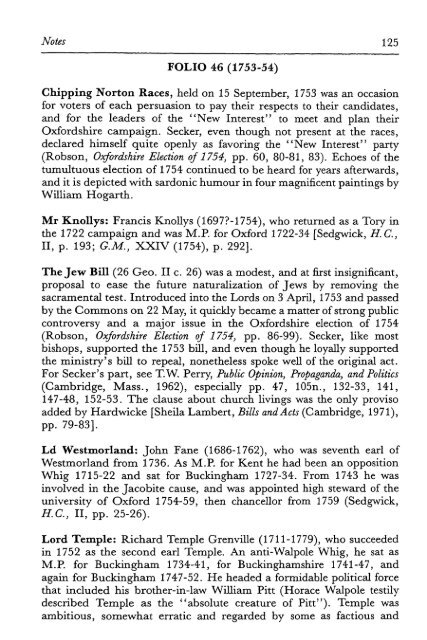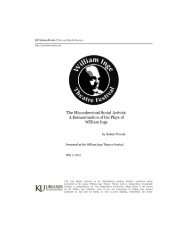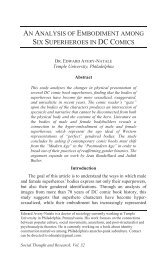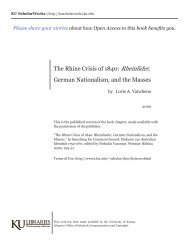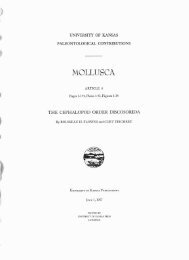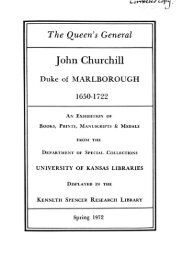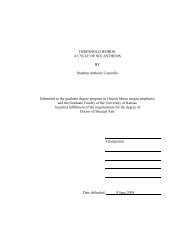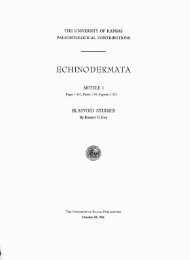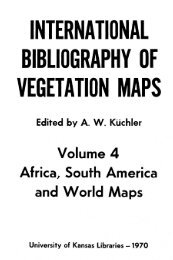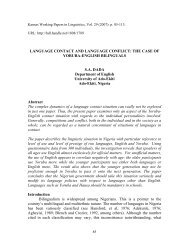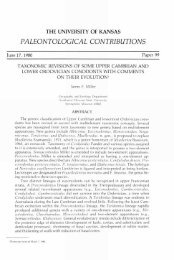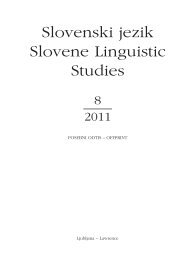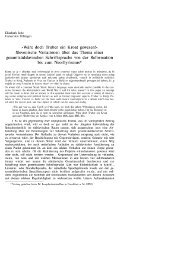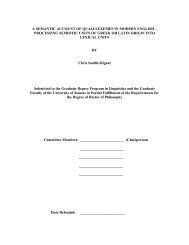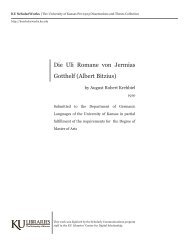Archbishop of Canterbury - KU ScholarWorks - The University of ...
Archbishop of Canterbury - KU ScholarWorks - The University of ...
Archbishop of Canterbury - KU ScholarWorks - The University of ...
Create successful ePaper yourself
Turn your PDF publications into a flip-book with our unique Google optimized e-Paper software.
Notes 125<br />
FOLIO 46 (1753-54)<br />
Chipping Norton Races, held on 15 September, 1753 was an occasion<br />
for voters <strong>of</strong> each persuasion to pay their respects to their candidates,<br />
and for the leaders <strong>of</strong> the "New Interest" to meet and plan their<br />
Oxfordshire campaign. Seeker, even though not present at the races,<br />
declared himself quite openly as favoring the "New Interest" party<br />
(Robson, Oxfordshire Election <strong>of</strong> 1754, pp. 60, 80-81, 83). Echoes <strong>of</strong> the<br />
tumultuous election <strong>of</strong> 1754 continued to be heard for years afterwards,<br />
and it is depicted with sardonic humour in four magnificent paintings by<br />
William Hogarth.<br />
Mr Knollys: Francis Knollys (1697?-1754), who returned as a Tory in<br />
the 1722 campaign and was M.R for Oxford 1722-34 [Sedgwick, H.C,<br />
II, p. 193; CM., XXIV (1754), p. 292].<br />
<strong>The</strong> Jew Bill (26 Geo. II c. 26) was a modest, and at first insignificant,<br />
proposal to ease the future naturalization <strong>of</strong> Jews by removing the<br />
sacramental test. Introduced into the Lords on 3 April, 1753 and passed<br />
by the Commons on 22 May, it quickly became a matter <strong>of</strong> strong public<br />
controversy and a major issue in the Oxfordshire election <strong>of</strong> 1754<br />
(Robson, Oxfordshire Election <strong>of</strong> 1754, pp. 86-99). Seeker, like most<br />
bishops, supported the 1753 bill, and even though he loyally supported<br />
the ministry's bill to repeal, nonetheless spoke well <strong>of</strong> the original act.<br />
For Seeker's part, see T.W. Perry, Public Opinion, Propaganda, and Politics<br />
(Cambridge, Mass., 1962), especially pp. 47, 105n., 132-33, 141,<br />
147-48, 152-53. <strong>The</strong> clause about church livings was the only proviso<br />
added by Hardwicke [Sheila Lambert, Bills and Acts (Cambridge, 1971),<br />
pp. 79-83].<br />
Ld Westmorland: John Fane (1686-1762), who was seventh earl <strong>of</strong><br />
Westmorland from 1736. As M.R for Kent he had been an opposition<br />
Whig 1715-22 and sat for Buckingham 1727-34. From 1743 he was<br />
involved in the Jacobite cause, and was appointed high steward <strong>of</strong> the<br />
university <strong>of</strong> Oxford 1754-59, then chancellor from 1759 (Sedgwick,<br />
H.C3 II, pp. 25-26).<br />
Lord Temple: Richard Temple Grenville (1711-1779), who succeeded<br />
in 1752 as the second earl Temple. An anti-Walpole Whig, he sat as<br />
M.P. for Buckingham 1734-41, for Buckinghamshire 1741-47, and<br />
again for Buckingham 1747-52. He headed a formidable political force<br />
that included his brother-in-law William Pitt (Horace Walpole testily<br />
described Temple as the "absolute creature <strong>of</strong> Pitt"). Temple was<br />
ambitious, somewhat erratic and regarded by some as factious and


